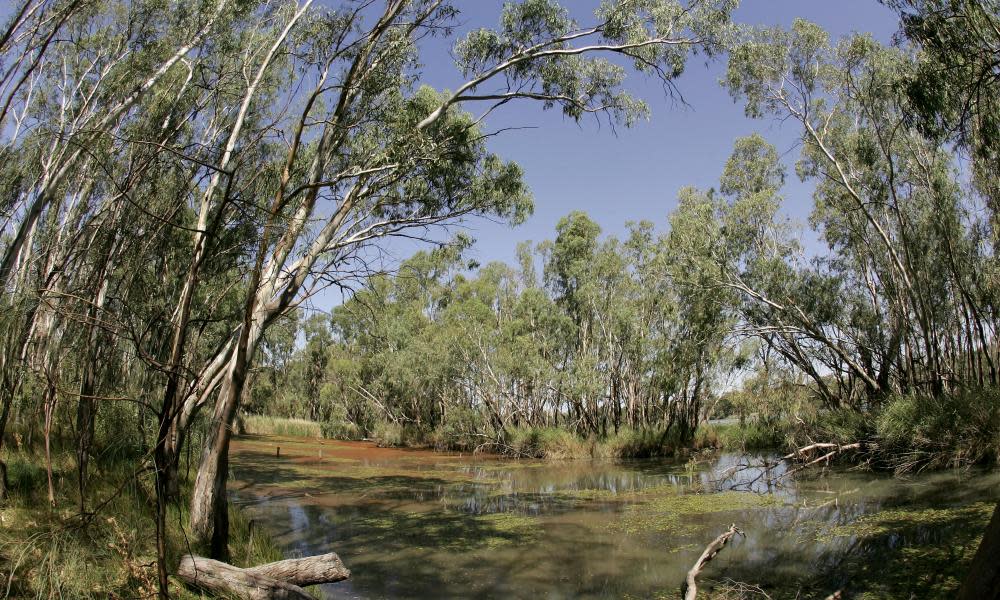Murray-Darling basin plan could collapse if changes blocked, Coalition says

The Murray-Darling basin plan is in danger of unravelling if adjustments are blocked in the Senate or it is put on hold, as scientists suggest, the federal water minister, David Littleproud, has warned.
A group of scientists and economists issued a “Murray-Darling declaration” on Monday and called for a pause in the plan and a full scientific audit, saying that, despite spending billions on water recovery projects, it is failing to improve the river’s overall health.
Sarah Wheeler, professor of water economics at the University of Adelaide, said the group of 12 economists and scientists were calling for an audit of all environmental water recovery outcomes to date.
“We’ve spent $6bn in trying to achieve sustainable water outcomes in the basin and all of us here question how much this has actually been achieved,” she said.
Her university colleague, associate professor David Paton, said the barometer of how well the plan was doing was the Coorong wetlands in South Australia, which were continuing to deteriorate.
“The 3,200 gigalitres which has been promised for the environment is already a compromised position,” he said. “More than that is actually needed to actually have a healthy environment. If we’re going to shortchange the 3,200 gigalitres even more, then expect the environment to continue to deteriorate.”
But Littleproud said that years of “further water wars” would rip certainty from rural communities and businesses, and the environment.
“Water returned to the system has already seen an increase in grey teal and black-winged stilt populations; frog numbers in the mid-Murrumbidgee have risen and Moira grass and in-stream vegetation is increasing,” he said. “The best thing for the river system and river communities is to stay the course on the basin plan.”
The federal government has introduced two significant alterations to the plan via regulations, which can be disallowed by the Senate.
The latest amendment to the plan – a slate of infrastructure projects that aim to improve water efficiency and which will count toward overall targets to improve environmental flows – were due to be introduced on Monday by Littleproud.
The Greens have already moved to disallow a 70-gigalitre cut to the recovery target for environmental water from the northern basin. This would affect irrigators in Queensland and northwest New South Wales, and was also opposed by some mayors who fear it would cripple local economies. It would cut the water recovery target by 18% for that basin, to 320GL.
A second regulation would amend the plan to allow 605GL of water efficiency projects to count towards the plan’s sustainable diversion limits.
The same regulation also includes a repeat commitment to the contentious second stage of the Murray-Darling plan to recover a further 450GLs of water for the environment by 2024. This would bring the total return of irrigation water back to the river system to 3,200GLs.
But scientists and economists remain sceptical about whether the so-called “downwater” efficiency projects will really deliver the environmental dividend promised.
A spokesman for Littleproud warned that dissallowing the regulation could put the whole plan at risk. The 605GL of “downwater” and the 450GL of “upwater” were tied together.
But the Greens defended their stance to block the two sets of changes, saying the plan to save the Murray-Darling basin was failing and the river would die without an urgent refocus.
“A full, independent audit of the plan is urgently needed,” the Greens’ spokeswoman on water, Sarah Hanson-Young, said. “The intervention by economists and scientists today shows that there’s serious lack of trust amongst policy experts.
“Scandals of water theft, tampering of water meters and rorting of public money spent on water and irrigation subsidies with little water being returned to the river has undermined the plan and wasted billions of taxpayers’ dollars.
“Despite these scandals, the Senate is being asked to agree to a further weakening of environmental allocations. The Greens will not stand by and let this happen, which is why we will move to disallow the government’s recent push to weaken the plan’s existing sustainable diversion limits.”
Labor, whose votes are crucial, has yet to decide its position on the disallowance motions.

 Yahoo News
Yahoo News 
